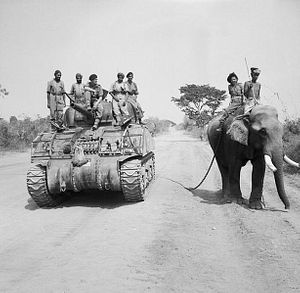August 15 is a day of enormous significance in Asia. In Northeast and Southeast Asia, August 15, 1945 is widely regarded as Victory over Japan (V-J) Day, when Japan announced its decision to surrender, ending years of brutal warfare. In South Asia, August 15 is also an important date—the British partitioned and left their Indian Empire on August 15, 1947, bringing independence to India (Pakistan gained its independence a day earlier, on August 14).
That these two dates are the same is no coincidence. The last viceroy of British India, Lord Mountbatten, said he chose the date of August 15 for the end of the Raj because of its significance throughout Asia, and it came to mind when he had to pick a date for the end of British rule in India (and Pakistan—though Pakistan chose to celebrate its independence on August 14 to distinguish itself from India). The British were also anxious to leave India as soon as possible and the date suited their timeline. In fact, many historians believe that the drain of World War II hastened the department of the British from India, but this is quite disputed by other historians.
Another theory—based entirely on anecdote but sometimes heard in India, is that the date was chosen to drive a wedge between the Japanese and Indians, as Indians would be celebrating on a day the Japanese would be mourning. However, obviously this is not the case, considering the strong relationship between India and Japan. In fact, many Japanese appreciate the fact that during the postwar International Military Tribunal for the Far East (the Tokyo trials), an Indian justice, Radhabinod Pal, was the only one out of eleven allied judges who handed down a not-guilty verdict for Japan’s top wartime leaders. It is not that Justice Pal denied or excused the atrocities committed by Imperial Japan—he fully acknowledged events such as the Nanjing massacres. Rather, he objected to the notion of victor’s justice and the ex post facto application of laws to try Japanese criminals. According to Justice Pal, Japan had “merely aped” Western powers.
Justice Pal’s judgement sheds light on the ambiguous feelings toward World War II in India, where Axis aggression and Allied colonialism were seen as being flip sides of the coin of militarism and imperial dominance. According to Takeshi Nakajima, an associate professor at the Hokkaido University Public Policy School, “All imperialist powers were part of the same gang to him [Pal].”
For Indian leaders during World War II, Japan was generally more on the radar than Germany, being both closer and more relevant as an Asian model. Ultimately, most Indian leaders advocated a somewhat neutral stance, though there was a general desire to at least see Nazi Germany defeated. Additionally, the famous Indian writer Rabindranath Tagore heavily criticized Japan’s invasion of China. On the flip side of the coin, the Indian nationalist leader Subhas Chandra Bose formed the Indian National Army with Japanese support and Japanese-captured Indian prisoners of war, though the military success of this force was limited. However, British attempts to try these returned soldiers after the war for treason triggered the great naval Mutiny of 1946, a total strike by Indian sailors in Bombay, Karachi, and Calcutta. This hurt the power of the British naval forces in India, with many Indian units no longer being seen as trustworthy.
The primary position of the “mainstream” Indian National Congress, however was that while India supported the victory of the allies, it was dragged into the war as an unwilling participant and would not help the British until granted independence. This was a position of neither support nor sabotage. Independence was the main demand of the Quit India Movement, which started in 1942, and saw many of its leaders such as Mahatma Gandhi and Jawaharlal Nehru thrown in jail for most of the rest of the war. On the other hand, the All-India Muslim League led by Muhammad Ali Jinnah fully cooperated with the British during the war, which undoubtedly strengthened their position in demanding a separate Pakistan afterwards.
Beyond the intellectual sense, World War II did indeed touch India in many ways—over 2.5 million Indian soldiers served in the British Indian Army and Royal Indian Navy and were the main soldiers captured when Singapore fell to the Japanese in 1942 and fighters when the Japanese advanced into eastern India was stopped at the Battle of Kohima in 1944. Indian industry expanded rapidly during the war, becoming the fourth largest in the world.
However, India also suffered a devastating disaster during this period, one of history’s largest man-made famines, the Bengal Famine of 1943, which killed an estimated 4 million people. Although there was enough food and no physical shortage of rice, increased prices due to war speculation, the Japanese occupation of neighboring Burma, and the British need to reroute supplies for the war in Europe all created massive starvation in Bengal. The Bengal Famine left a toxic legacy of Indian distrust for the British, who were seen as having valued British lives over Indian lives; moreover, the British government was criticized for not having provided relief. During the famine, the British viceroy of India urgently requested food for Bengal and a halt of agricultural exports from that region but was rebuffed by British Prime Minister Winston Churchill who asked why Gandhi had not died yet (most British leaders by this time were sympathetic toward the eventual goal of Indian independence but Churchill was almost rabidly opposed to Indian independence, an attitude described by other British as “Hitler-like”).
Though very little fighting was done in the subcontinent itself, Indian soldiers played a major role in the war and the contribution of India to the war and its aftermath played a major role in the intellectual development and politics of South Asia and the Asia-Pacific.

































